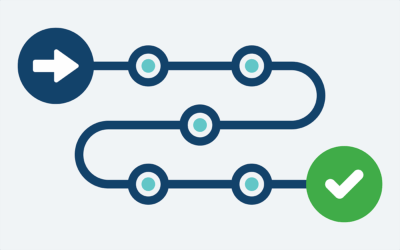If you’d like to optimize your sales organization, consider hiring a sales enablement manager. A sales enablement manager is a strategic role focused on equipping sales teams with the tools, content, sales training, and processes they need.
Sales enablement is increasingly recognized as a crucial lever for sales teams striving to “do more with less.”
- Companies with a dedicated sales enablement person or team have 15% better win rates.
- Sales enablement investment has been found to reduce sales turnover rates by 59%.
Not all companies have this role, but those that do have sales teams that operate more efficiently, close deals faster, and feel more supported in their roles. This post covers the responsibilities, skills, and benefits of a sales enablement manager.
6 Core Responsibilities of a Sales Enablement Manager
A sales enablement manager supports the sales team by providing sales training and content needed to increase sales performance, drive revenue growth, and improve sales efficiency. Their main goal is to increase sales team productivity.
The role has become increasingly important in recent years due to the increasing complexity of the B2B decision-making process and the rise of informed buyers. Depending on the size of the organization and sales team, sales enablement managers may have one or more of these six responsibilities.
1. Sales Content and Resource Management
Creating and maintaining sales collateral such as presentation decks, case studies, competitive battle cards, and product sheets. They ensure sales professionals have up-to-date, relevant materials for every stage of the sales process.
2. Sales Training and Onboarding
Developing training programs for new hires and ongoing skill development for existing team members. This includes product training, sales methodology, and competitive positioning.
3. Sales Process Optimization
Analyzing the sales funnel to identify bottlenecks and implementing improvements. They work to standardize best practices across the sales organization.
4. Technology and Tools
Managing the sales tech stack, including LMS platform, CRM system, sales automation tools, and content management platforms. They ensure proper adoption and optimization of these technologies.
5. Performance Analytics
Tracking sales performance metrics such as content usage, training effectiveness, and sales performance to measure the impact of enablement initiatives and identify areas for improvement.
6. Cross-functional Collaboration
Working closely with marketing, product, human resources, and customer success teams to align messaging and ensure sales has the support they need from other departments.
What Skills Do You Need for a Sales Enablement Career?
Effective sales enablement managers need a diverse skill set that combines strategic thinking, technical abilities, and strong interpersonal skills. The most successful sales enablement managers combine deep sales knowledge with strong operational skills and the ability to influence without direct authority.
Strategic and Analytical Skills
Data Analysis: Ability to interpret sales metrics, content performance data, and training effectiveness to make informed decisions. They need to identify trends, spot problems, and measure ROI on enablement initiatives.
Process Design: Skills in mapping out and optimizing sales processes, creating workflows, and implementing systematic approaches that can be replicated across the team.
Project Management: Managing multiple initiatives simultaneously, from content creation to training rollouts, while meeting deadlines and coordinating cross-functional teams.
Communication and Content Skills
Content Creation: Strong writing and presentation skills to develop compelling sales materials, training content, and documentation that resonates with both sales teams and prospects.
Training and Facilitation: Ability to design and deliver engaging training programs, workshops, and sales coaching sessions that actually change behavior and improve performance.
Stakeholder Management: Excellent communication skills to work effectively with sales leadership, marketing, product teams, and individual sales professionals at all levels.
Technical and Operational Skills
Technology Proficiency: Understanding of CRM systems, sales automation tools, content management platforms, and learning management systems. Ability to evaluate and implement new technologies.
Sales Methodology Knowledge: Deep understanding of various sales approaches and when to apply different techniques.
Market and Competitive Intelligence: Skills in researching competitors, understanding market dynamics, and translating this knowledge into actionable insights for sales teams.
Personal Attributes
Sales Experience: Many of the best enablement managers have been successful salespeople themselves, giving them credibility and understanding of real-world selling challenges.
Change Management: Ability to drive adoption of new processes and tools, overcoming resistance and helping teams embrace new ways of working.
Continuous Learning Mindset: The sales landscape evolves rapidly, so staying current with new methodologies, technologies, and best practices is crucial.
Benefits of Hiring an Enablement Manager
Hiring a sales enablement manager delivers significant benefits that directly impact sales team performance and job satisfaction:
Improved Sales Performance: Sellers gain access to better tools, training, and resources that help them close more deals. Studies show companies with dedicated sales enablement see higher win rates and shorter sales cycles.
Faster Onboarding: New hires get up to speed much quicker with structured training programs and clear processes, reducing the typical 6- to 12-month ramp time. This means new sellers start contributing to revenue sooner.
Better Quality Leads and Opportunities: Sales enablement managers work with marketing to ensure better lead qualification and handoff processes, so sellers spend more time on high-quality prospects rather than chasing dead ends.
Reduced Administrative Burden: Sellers spend less time hunting for the right presentation, case study, or pricing sheet. Everything is organized and easily accessible, allowing them to focus on actual selling activities.
Enhanced Skills and Confidence: Regular training on objection handling, competitive positioning, and industry trends makes sellers more confident in sales conversations and better equipped to handle complex deals.
Consistent Messaging: Everyone uses the same compelling value propositions and positioning, creating a more professional customer experience and reducing confusion in the market.
Access to Real-Time Insights: Sales enablement managers provide competitive intelligence, market updates, and customer feedback that help reps adapt their approach and stay ahead of trends.
Career Development Support: Many sales enablement managers also focus on seller development—providing sales coaching and creating clear career progression paths that improve retention and job satisfaction.
Ready to Improve Sales Enablement?
If you are considering hiring a sales enablement manager, contact The Brooks Group today for training resources and solutions tailored to your specific needs.
Frequently Asked Questions
What Are the Most Important Elements of Sales Enablement?
The two most critical elements of being a sales enablement manager are training and coaching.
With the proper training and coaching, sales professionals gain the skills and confidence to understand customer needs and wants, qualify prospects effectively, build long-lasting relationships, and close more deals.
What Problems Does Sales Enablement Solve?
The main problems a sales enablement manager solves are sales performance issues and a lack of alignment between the marketing, product, and sales teams. Knowledge gaps between teams can hinder company growth. Proactively identifying issues and working collaboratively helps sales teams get the most effective training and content.
What Is the Difference Between Sales Operations and Sales Enablement?
Sales enablement mainly focuses on seller education, product training, and coaching. Sales operations is responsible for tracking the sales process, deal progress, and the CRM. The two work hand in hand and also collaborate with the marketing team.




